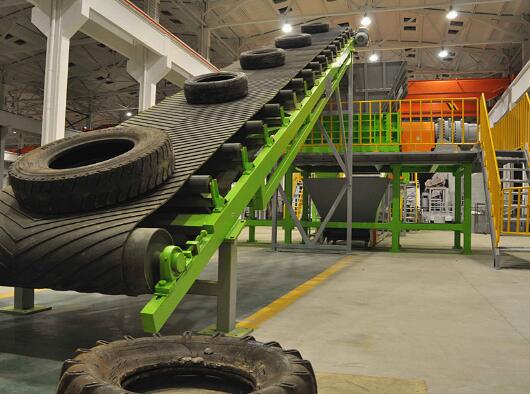Tire recycling is a critical process that not only addresses the growing issue of tire disposal but also contributes to sustainable practices and environmental conservation. At Optima, we take pride in manufacturing state-of-the-art tire recycling machines, offering a comprehensive solution to transform discarded tires into valuable resources. Let's delve into the key stages of the tire recycling process.

The tire recycling journey begins with the collection of used or discarded tires from various sources. These tires undergo a thorough inspection to assess their condition and determine their suitability for recycling. At this stage, damaged or unsuitable tires may be sorted out for alternative disposal methods.
Once the tires pass inspection, they enter the tire shredding phase. Our advanced tire recycling machines at Optima excel in shredding whole tires into smaller, more manageable pieces. This step is crucial as it prepares the tires for further processing and ensures an efficient recycling workflow.
Tires contain steel wires that provide structural integrity. In the tire recycling process, these wires must be removed to enhance the quality of the recycled materials. Specialized equipment is employed to separate the steel wires from the shredded rubber, allowing for a cleaner and more refined end product.
After wire removal, the shredded rubber undergoes granulation. This involves further reducing the size of the rubber particles to produce granules or crumb rubber. Optima's tire recycling equipment excels in achieving the desired particle size, providing versatility for various applications, including playground surfaces, asphalt modification, and more.
To enhance the purity of the recycled rubber, a magnetic separation process is employed to remove any remaining metal particles. This step ensures that the final product meets industry standards and is free from contaminants, making it suitable for a wide range of applications.
Fine milling is the final stage in the tire recycling process, where the rubber granules undergo additional refinement. This step is crucial for achieving a consistent particle size and texture, making the recycled rubber suitable for applications such as the production of rubberized asphalt or manufacturing new rubber products.
In conclusion, the tire recycling process is a comprehensive and environmentally responsible solution to the growing challenge of tire disposal. At Optima, we stand at the forefront of tire recycling equipment manufacturing, providing cutting-edge solutions to address the diverse needs of the industry.
If you are looking for a reliable tire recycling equipment supplier, look no further. Optima's tire recycling machines are designed to deliver efficiency, precision, and environmental sustainability. Contact us today to discuss your requirements and explore how our advanced equipment can contribute to your tire recycling initiatives. Partner with Optima for a greener and more sustainable future.
Previous: A Guide To Laser Water Chiller?
Next: None.
Copyright:@2020-2021
Comments Please sign in or sign up to post.
0
0 of 500 characters used